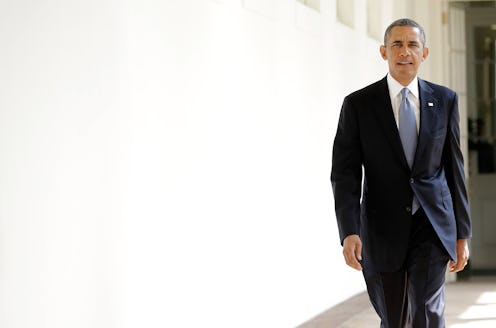News
Syria Agrees To Halt Weapons: But Will Obama Bite?
The Syrian government has now agreed to declare its chemical weapons stockpile, just as Russia refuses to accept a tentative UN resolution.
"We are ready to state where the chemical weapons are, to halt production of chemical weapons and show these installations to representatives of Russia, other countries and the UN," Syrian Foreign Minister Walid al-Muallem said in a statement sent to Russia's Interfax news agency Tuesday.
Meanwhile, President Barack Obama seems to be getting more comfortable considering other options ahead of his national address Tuesday evening, and officials say he has "updated his speech" to reflect the latest developments.
The president discussed the Russian proposal with his close allies French President Francois Hollande and British Prime Minister David Cameron Tuesday, and reportedly agreed to take a serious look at its viability via a possible UN Security Council Resolution.
"Let's see if we can come up with language that avoids a strike but accomplishes our key goals to make sure that these chemical weapons are not used," Obama told ABC News.
One possibility included having the United Nations supervise the collection and dismantling of the chemical weapons.
The proposal, put forward by Russia on Monday in response to what seemed like a glib statement by Secretary of State John Kerry, asks that Syrian President Bashar al-Assad's government put their chemical weapon stockpile under international control and agree to have them dismantled.
So far, it seems like the administration is (skeptically) embracing this diplomatic alternative.
“We would welcome a decision and action by Syria to give up its chemical weapons,” said Deputy National Security Adviser Antony J. Blinken.
White House Press Secretary Jay Carney said that the administration sees “this as potentially a positive development and [...] as a clear result of the pressure that’s been put on Syria by the fact that the president has been moving forward.”
But there are of course still many doubts. Defense Secretary Chuck Hagel has said that the administration is "hopeful," but added pointedly that they "must be clear-eyed and ensure it is not a stalling tactic by Syria and its Russian patrons."
Obama also echoed the skepticism, saying, "I think you have to take it with a grain of salt initially."
And there are other worries: for one thing, if Assad were to agree turning over the chemical weapons, it would be difficult — near to impossible — to tell whether they've all been handed in. Moving chemical weapons is also extremely dangerous: the safest way to get rid of them would be to burn them on site, a process that would take months, maybe even years.
“If Assad said he was turning this stuff over, how would we know if he has really complied?” one intelligence official asked.
But according Russia's Interfax news agency, Syria is now prepared to reveal its chemical weapons stockpile and stop its production.
"We are ready to state where the chemical weapons are, to halt production of chemical weapons and show these installations to representatives of Russia, other countries and the UN," Foreign Minister Walid al-Muallem said Tuesday.
It's far from sorted, however.
A bipartisan group of senators — including Senators John McCain and Charles Schumer — are quickly hopping on the bandwagon, drafting a new resolution in order to delay a military strike against Syria, and buy the United Nations some extra time. Crucially, however, the resolution would authorize the full use of force if those efforts fail.
And according to French Foreign Minister Laurent Fabius, Russia won't agree to a binding U.N. Security Council resolution that would allow military intervention if Syria failed to follow through with its promises.
One politically advantageous result of pursuing a diplomatic course would of course be a delay on voting on the strike in Congress. Politico reports that Obama wants a vote in Congress to be delayed until this latest round of diplomatic efforts has a chance to play out.
"I don't anticipate that you would see a succession of votes this week or anytime in the immediate future," Obama said.With Obama's foreign policy approval rating sitting at an all-time low, a diplomatic alternative may just be the out he needs.
